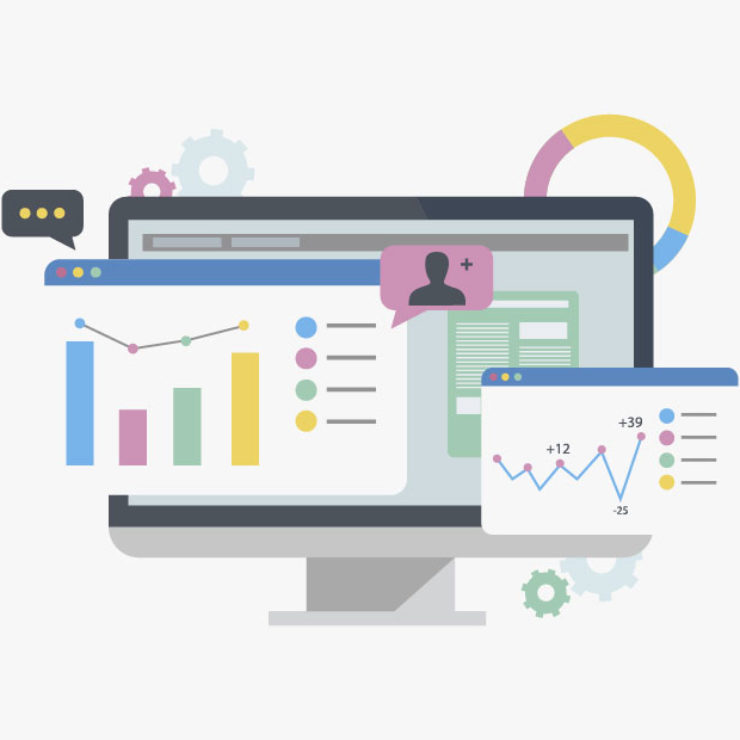To provide a complete customer experience, you need to perform flawless process management. CRM, which has a significant impact at this point, aggregates data from advertising, e-mail, marketing, sales, websites, physical stores, mobile sales, and call centres.
Advances in technology increase competition in all sectors and require product and customer-oriented management. For this reason, it is vital to offer products or services that meet the needs and expectations of customers in all industries. In addition, the increase in production costs focuses companies on individual sales. As a result, the necessity of using marketing channels effectively arises. This is where CRM (Customer Relationship Management) comes into play.
Advantages of CRM
CRM solutions were previously preferred only by large-scale companies due to the installation cost and training process. Today, with the software developed thanks to cloud technology, small businesses have started to use the advantages of these solutions. Cloud-based CRM software eliminates infrastructure, installation and maintenance costs. At the same time, it makes it possible to access customer and sales data from any environment on the Internet. Thanks to CRM, which also offers mobile application support, sales teams working in the field, employees going to new customer meetings and service personnel; can access all necessary information instantly and enter data. CRM applications prevent time loss, especially for sales and marketing personnel.
Regular management of your data is possible with CRM software. All critical points such as customer information, received and sent offers, and contracts are presented regularly, and you can access this presentation at any time. In addition, CRM makes automatic data entry and thus supports the acceleration of the business process. For example, it automatically saves the information of new customers who fill out forms on the site, integrated with your website. In this way, you can be informed quickly of each new customer candidate.
CRM also makes it easy for the sales team to plan their activities. When you use this system, you can follow what the sales team is interested in and every step. Again, thanks to the same system, you can evaluate potential customers and direct them to the sales team and plan the sales stages. Thanks to the fact that the information about the customers and all the sales made are accessible to everyone, your team; You can reach the most up-to-date information by following the ongoing sales, new orders and negotiation processes. As a result of this, your team’s collaborative work and work efficiency increase.
How Should a CRM Software Be?
The CRM software you will use can only be used in-house, in the cloud, or both. As with all business software, the decision to host the CRM system on-premises, in the cloud or in hybrid depends on your business model. In-house CRM solutions provide complete control over the system. However, you must purchase in-house systems, install these systems, and monitor them at regular intervals. In addition, you should not disrupt updates and upgrades by performing routine maintenance of the systems. In addition, cloud-based CRM systems are easier to use and require less IT team involvement than on-premises solutions. Cloud-based solutions that do not require much investment also offer a straightforward interface. In cloud-based solutions, any user can update, and upgrades happen automatically. Finally, you can easily access cloud-based systems from anywhere with an internet connection.
Hybrid CRM models offer the best of both models. Companies that prefer in-house CRM support and invest a large amount of money in this direction may fall behind and come to a point where they cannot compete when their competitors switch to the cloud model. Mobility in in-house systems is limited. Accessing new functions is long and tiring. In addition, access to advanced artificial intelligence technology cannot be provided. When you evaluate all these processes, you can determine the most suitable CRM solution for your business.
Measuring the Effectiveness of the CRM System
The ultimate goal of the CRM system is to help you acquire and retain customers. Therefore, CRM is a business investment with measurable return. You can follow many metrics to understand whether this software is sufficient to provide you with the return you want in marketing and service, especially in sales.
It doesn’t matter if you monitor the performance of the whole process, evaluate this performance or use another model. You can look at metrics such as customer acquisition cost, customer lifetime value, sales cycle and its length, customer retention, increased sales rate, net new revenue generated, and time to recover customer acquisition costs. However, there is no obligation to create a list that includes every metric. You can follow corporate processes and the performance of these processes, the recommendation score reflecting the customer’s perception, and the measures that evaluate the fit of the strategy. Ultimately, these metrics you follow will be based on your strategic goals and objectives.
Why Use CRM Software?
There is little difference between competing products and their features. For this reason, many customers today give importance to their experiences with the brand and guide the purchasing process in this direction. You, too, need to perform flawless process management to ensure a complete customer experience. CRM, which has a significant impact at this point, aggregates data from advertising, e-mail, marketing, sales, websites, physical stores, mobile sales, and call centres. Because who the customer base is, what they want, the interactions established in the past and what may happen in the future are extremely important for CRM.




